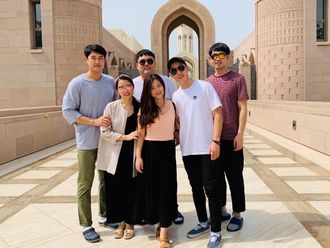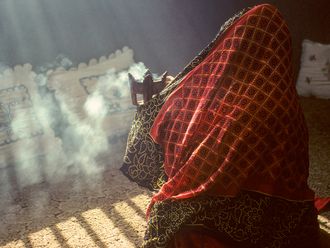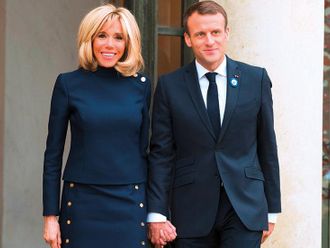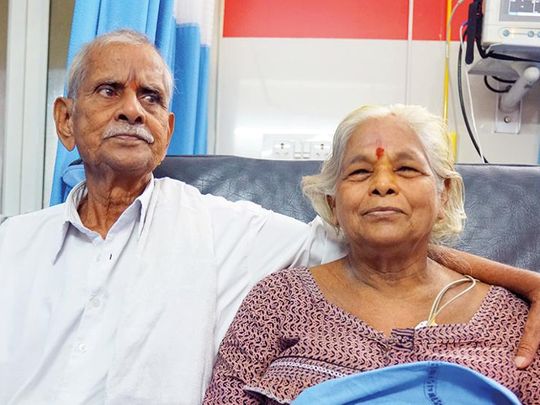
Rajaram Rao gently touches the face of one of his twin daughters, and playfully tickles her cheek. The sense of awe, joy and pride of a first-time father lavishing love on his child is writ large on the man’s face. He gently adjusts the blanket covering the baby before leaning over to his other twin. ‘I’ve always wanted to play with a child of my own,’ he says. ‘It’s only that we had to wait for more than five decades after our marriage to be blessed with not one but two lovely children. I cannot wait for them to grow up to play with them.’
His wife Erramatti Mangayamma, who is resting on the bed, looks at the children lovingly. Their almost year-long stay in a hospital far from her native village in the southern Indian state of Andhra Pradesh during her pregnancy was well worth it. ‘No longer can anyone call me barren or look down upon me for not having children,’ she says, her voice resonating with pride.
[This couple in their seventies never gave up their dream of having a baby]
Having two children has changed her and her husband’s life, ushering in not just the joy of having kids of their own but equally earning her a sense of respect and admiration from people in the village.
Erramatti and her husband Rajaram’s story is unlike any other couple’s.
End to a 50 plus years of wait
While most medical practitioners consider the average age limit for IVF treatment to be around the 40-year mark – becoming a mother after 40 puts mum and foetus at various risks – Erramatti was 72 when she approached an IVF clinic requesting that she wanted to have a child.
And she did.
At 10.30am, on September 5 last year, Erramatti and her 78-year-old husband Rajaram Rao became proud parents of two baby girls.

Dr S Umashankar, gynaecologist and head of Ahalya Nursing Home in Guntur in Andhra Pradesh, still remembers the day when the couple walked into his consultation room.
‘It was Nov 12, 2018, when the elderly couple came for a consultation,’ he recalls. ‘It took the two a few minutes before they told me a bit hesitantly that they wanted to have children.’
Erramatti first heard about Dr Umashankar from a neighbour whom she met during a wedding ceremony in their village. The neighbour had conceived through IVF at the age of 55, and well aware that Erramatti was keen to have a family of her own, suggested she meet the doctor for help with her pregnancy.
What Dr Umashankar didn’t know at the time of the first consultation was that Erramatti was 72 years old.
‘Initially she lied to us that she was 65 and was keen to undergo IVF treatment to have a child,’ he says. ‘We discovered the truth only after her husband and family submitted her school records, which showed her birthday as September 1, 1946,’ Dr Umashankar says.
Erramatti was determined to conceive and if it meant concealing certain facts, so be it. For her, motherhood was a way to attain salvation not only in life, but from the social stigma that she faced from her village people.
In a culture where motherhood is considered sacred and where thousands of women in rural India are often ostracised for being childless, she was keen to have a child to prove not just to herself but also to society that she was a woman in all senses of the word.
‘A few years after marriage when we realised Erramatti was not conceiving, we did consult a local doctor,’ says Rajaram. However, the medications did not prove beneficial. The couple then consulted a few more doctors in their village, but sadly for them, parenthood appeared to be a fading dream.
‘When nothing seemed to be working, we resigned ourselves to our fate – of being a childless couple,’ says Erramatti. ‘However, there were several people in our village who would constantly taunt my wife calling her a ‘barren’ woman for her inability in having kids. It was very painful, but there was nothing we could do.’
Rajaram remembers how he used to see fathers taking their children to school and always hoped some day he too could do the same. ‘But when the medicines the doctors in my village gave us failed, I came to accept that we would never have kids,’ he says.
Then three years ago, Erramatti met the friend at the wedding, and everything changed.
Living in hope
Initially, the hospital authorities were reluctant to take on the case given Erramatti’s advanced age, even though the figure she mentioned at the first consultation was far lower than her actual age. ‘We gave them both a complete run down on the associated risks of the treatment in such an advanced age,’ says the doctor. But the couple, who were keen to clutch on to this last straw, were determined to go ahead whatever the risks could be.
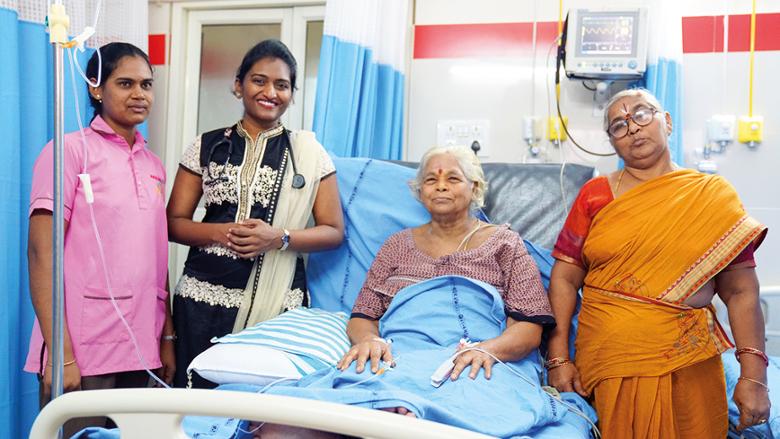
The doctor then made it clear that Erramatti would have to stay in the hospital for the entire course of her pregnancy. ‘I told her husband that I cannot let her go home, as that would jeopardise the entire treatment plan,’ Dr Umashankar says.
The couple who are of modest means – Rao is a farmer who owns a small plot of land – were not sure whether they could afford to pay for a prolonged treatment and stay at the hospital. But luckily for them, the hospital administration stepped forward, offering to bear the entire cost of treatment courtesy of the hospital trust. The couple were overjoyed.
Once the financial hurdle was crossed, Erramatti moved into the hospital, quickly bonding with other expectant mothers. The hospital staff remember her as being jovial, cracking jokes, and becoming good friends with the nurses.
From the time of her first check-up, Erramatti was monitored by a team of 10 doctors, who were responsible for checking three core aspects of her health – diet and nutrition, blood pressure, and any possible complications due to the pregnancy itself. They did not have to worry a lot as regular scans revealed her body was in surprisingly good health despite her age. She did not suffer from diabetes or hypertension, which made the work of the doctors slightly easier.
Since she had passed the menopausal stage, doctors began treatment by administering medicines to restart her periods. To the surprise of both the doctors and the couple, Erramatti conceived in the very first cycle of the IVF procedure.
Erramatti’s pregnancy progressed without any complications but in the eighth week the doctors made a new discovery – a scan revealed that she was carrying twins. While the doctors were a tad alarmed wondering whether her body would be able to manage twins, the couple was elated.
Erramatti was ecstatic. She was finally pregnant, after 57 years of marriage.
Having suffered all the jibes and taunts, now she was having twins. ‘This is divine justice. God made us crave so much for one child our whole life, and now he is making up for it with two,’ says the septuagenarian from Nelapartipadu of East Godavari, Andhra Pradesh.
Erramatti clearly needed a lot more care and attention after the discovery of a second child, the doctors felt, as there were a lot of variables associated with her health that could go wrong. Apart from taking care of her physical health, the couple were also given several rounds of psychological counselling to help them cope well with the process of becoming parents in their 70s.
Giving birth to a pair of miracles
On D-day, Erramatti was wheeled into the operation theatre. The medical team had decided to perform a C-section as her body could not cope with natural childbirth. Three hours later, one of the doctors emerged to announce that Erramatti had delivered two healthy baby girls.
‘At first, I couldn’t believe it myself. It’s a medical miracle,’ Dr Umashankar says, the pride still resonating in his voice.‘Given her age, we were prepared to deal with any complications that might develop during the delivery. To our surprise, everything went off smoothly.’

While Erramatti appeared fine, it was Rao who developed a health condition. While sitting outside the ICU after ushering his wife inside, a nurse noticed that Rao was panting severely and clutching his chest.
‘As a precautionary measure, we put him under observation,’ says Dr Umashankar. ‘Given that he’s 78, it was a little too much for him to handle, with his wife in the ICU and kids in the incubator. Besides, all that running around might have aggravated his pre-existing complications. However, he never had a stroke, as reported by a certain section of media before,’ the doctor added.
The babies were initially fed bottled milk – Erramatti could not breastfeed her babies as her body has stopped producing milk. The family has arranged for a local wet nurse to feed the babies.
‘My wife and I were humiliated every single day for being childless, for decades,’ says Rao. ‘Suggestions from self-proclaimed ‘experts’ poured in day and night – from taking exotic herbs to visiting shrines to pray for a child. They made us feel like we were not doing enough to have a baby.
‘They don’t know how it feels to overhear people wishing death upon you so they could usurp your property, and how it feels to be treated as an outcast for being childless. They wouldn’t know how it feels to console your wife, who had just been called a barren woman during a social event. We wanted to become parents at any cost – even if it amounted to risking our lives.’
Rao is now excited for the future. ‘I am going to do everything that I had been longing for decades.’
The critics abound. ‘There are some people who are blaming us for having kids so late, but then there were a lot more people who also blamed us for not having one for decades. So I am going to ignore them and enjoy parenthood,’ he says.
Looking ahead with hope
‘I would like to see them grow up, go to school… I would love to play with them in the evenings. I don’t think age would matter. After all, if my wife could have not one but two babies at her age, anything is possible.’
Earlier, 70-year-old Daljinder Kaur of Punjab was considered to be the oldest woman in the world to give birth to a baby. Daljinder delivered a baby boy in 2016 following an IVF treatment.
The going may not be easy for other older couples wanting to have children. In 2016, the Ethics Committee of the American Society for Reproductive Medicine passed a resolution to physicians strongly discouraging them from providing embryos to women over 55, ‘even when they have no underlying medical problems’.
The committee took into consideration concerns regarding maternal and foetal safety, longevity and the required psychosocial supports for raising a child to adulthood.
‘I thank God and the doctors who have made this possible,’ says Erramatti, tears streaming down her face. ‘No one can call me infertile now.’






